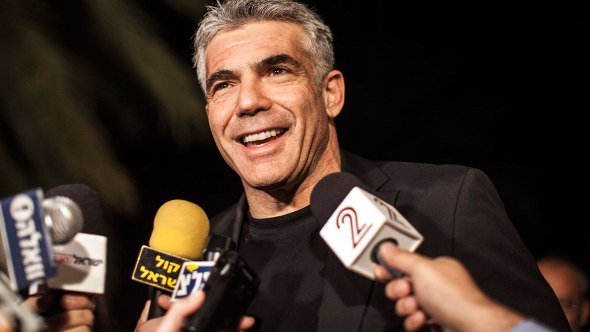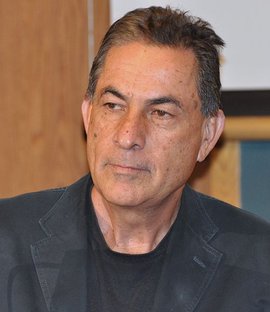Caught in the Honey Trap
The citizens of Israel had their say. Less than seventy per cent of eligible voters, Jews and Arabs, went on 22nd of January to the ballot boxes and chose between thirty-two parties, which were running for the Israeli parliament, the Knesset. The outcome was in no way a surprise: the Israelis chose more of the same. As expected, Benjamin Netanyahu will be the next prime minister of Israel. He is now the first person to serve in the position of Prime Minister for a third term since the founding father David Ben Gurion. And he will create a right-centre coalition, as predicted.
The only surprise in those elections was the relative success of the new star of Israeli politics, Yair Lapid, the chairman of the new party Yesh Atid (There is a future), who will definitely become the major partner in the next coalition government.
Many analysts – desperate for some change, and some hope, in Israeli politics – interpret the fact that Lapid, who is heading a centre party, became the leader of the second biggest party in Israel as a sign that the race toward the extreme right in Israeli politics has come to a halt.

But the fact is that Lapid also represents the mainstream of Israeli society and its fantasies, mainly the all-Israeli dream of being able to forget about all the crucial problems which Israel faces, to ignore them and deny them and instead concentrate on minor issues, like the question if the ultra-orthodox community of Israel will serve in the army or not, and continue to live in peace and denial.
Shying away from controversy
Lapid is the very embodiment of this dream, a good-looking and popular former TV anchor in the biggest commercial station and columnist in the biggest daily newspaper, who said very little in his campaign, and whose entire journalistic career was based on flattering the mainstream and shying away from any controversy. This Lapid may now be the strongest figure in Israeli politics. Without him, Netanyahu cannot form a stable government.
Lapid will be the nice face of Israel. Most probably the next foreign minister of Israel, he will show the world an agreeable, moderate, secular and modern face – someone who likes gadgets and is an amateur boxer, lives in the most fashionable neighbourhood of Tel Aviv and wears the trendiest sunglasses. "We came to change," was the slogan of his campaign, but the change Lapid wants is not a revolutionary one.
His main issues are recruiting the orthodox, as was said before, an almost impossible and unnecessary mission; to take care of the middle class, a promise as vague as it sounds; to decrease the number of ministers in the Israeli government; and last, and least, to get back to the negotiation table with the Palestinians. But Lapid, like other mainstream politicians in Israel, seem to be in love with the negotiations themselves. The negotiations are not longer a means to achieve peace, they have become an end in themselves.

But Lapid does not believe in peace with the Palestinians. He declared recently that Jerusalem will remain united forever, which means that half of it will remain occupied forever. Lapid knows this is a non-starter for any peace settlement, but he wants to get back to the negotiation table only to save face, to improve the international image of Israel, to show a different face than the stubborn, refusing face of the former government, but not much more. That is exactly the danger.
More time to build more settlements
With Lapid as a popular foreign minister, inexperienced and amateurish, and with Netanyahu in the prime minister's office, nationalist, right-wing and without any intentions to put an end to the Israeli occupation and to make peace with the Palestinians, the hope for a real change in Israeli policy is based almost on nothing.
On the contrary, now the world will hug the Israeli government, which might get back to the negotiation table. Israel will gain more time to build more settlements and to deepen the occupation and peace will not be seen, even at the distant horizon.
In this context, an extreme right-wing Israeli government, without the cosmetics of the centre parties, like Lapid and others, which will most probably join the government, might have been preferable, in a paradoxical way. Maybe only an extreme right-wing government would have served as a wake-up call for the world and above all for the United States and Europe, to start and act for achieving peace in the most explosive part of the world. But instead they risk getting caught in the honey trap of yet another Israeli government, which shows some nice faces and claims to have the intention to negotiate.
No need for negotiations
It must be said very clearly: there is no need for negotiations anymore. Tens of peace plans are gathering dusts in all kinds of drawers and one only need to choose one of them and implement it. What is lacking is a real and genuine desire of any Israeli government to put an end to the occupation.

No Israeli government until today had this crystal clear intention and there is no reason to believe that the next Netanyahu-led government, the third Netanyahu government, will be any different. The major partner Lapid might exert some influence, but he will use his success to achieve the goals on his own agenda, which, as I pointed out before, are mostly domestic, social economical and above all minor.
Israel is considered "the only democracy in the Middle East". The demonstration of free elections without any incidents or violence, which the world witnessed on the 22nd of January is really rare in the landscape of the Middle East. But this is just one side of the coin. On its other side, in the dark backyard of Israel, there is the reality of a brutal tyranny, military government and millions of people without civil rights who have lived under occupation for forty-five years – all this should also be remembered as an integral part of "the only democracy in the Middle East".
In the occupied territories Jewish settlers went to vote as free citizens of the state of Israel, but their immediate neighbours, part of whom own the land the settlers live on, did not participate in those elections, which will shape their future dramatically. This reality of occupation and apartheid will not be changed by the next Israeli government, elected by the nineteenth Knesset.
Gideon Levy
© Qantara.de 2013
Gideon Levy writes opinion pieces and a weekly column for the newspaper Haaretz that often focus on the Israeli occupation of the Palestinian territories.
Editor: Lewis Gropp/Qantara.de
